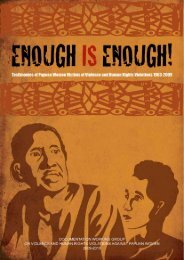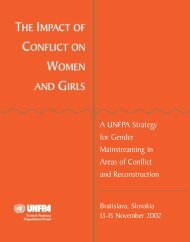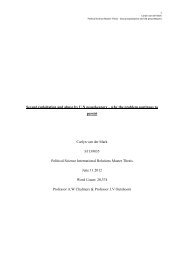IANSA [PDF, 2MB] - PeaceWomen
IANSA [PDF, 2MB] - PeaceWomen
IANSA [PDF, 2MB] - PeaceWomen
Create successful ePaper yourself
Turn your PDF publications into a flip-book with our unique Google optimized e-Paper software.
Armed domestic violence<br />
Case Study<br />
From the Lebanese Council to Resist Violence Against<br />
Woman (LECORVAW)<br />
Open Letter, 18 March 2011<br />
The Lebanese Council of Women, with its 170 member<br />
associations, severely condemns the crime that was<br />
perpetuated by a man who shot his wife with his hunting<br />
gun in a farm in the Bikka. The LCW is against this<br />
criminal act and insists that a law against violence<br />
against women be voted as soon as possible so that<br />
women are no longer men’s easy victims. We also ask<br />
that he be punished so it can serve as a lesson to other<br />
men, and so that lives of women are not at the mercy of<br />
men.<br />
In focus groups conducted in 2005, participants “discussed<br />
the ‘culture of violence resulting from the proliferation<br />
of small arms. Participants suggested that the,<br />
“Availability of small arms is “increasing levels of crime and<br />
violence against women …increasing the number of crimes<br />
committed in the name of honour”. 30<br />
In one case reported by the Lebanese Council to Resist<br />
Violence against Women (LECORVAW), a woman won a<br />
court case and managed to obtain separation from her<br />
husband by showing pictures of his guns. The case shows<br />
the psychological as well as physical impact of guns on<br />
women in the home.<br />
Women’s groups working with domestic violence victims<br />
reported feeling insecure themselves:<br />
“We had a case in Tripoli, where the father came<br />
to get his daughter [at our centre]. He had a gun<br />
and threatened us through the door. We were<br />
scared. We too are victims in those cases. Men<br />
come here to find the women we are protecting<br />
and threaten us. The government offers us no<br />
protection.” – Interview, Lebanese Council to<br />
Resist Violence against Woman (LECORVAW),<br />
May 2011<br />
Mrs. Ola suffered from her husband’s continued abuse and<br />
violence, in all its forms. She was abandoned for months.<br />
The violence she suffered took on many different forms,<br />
including sexual and psychological violence, severe beatings,<br />
hair pulling ... and the constant threat of weapons. Her<br />
husband kept his guns in a glass closet, placed in the living<br />
room, to remind her that he was always ready to shoot and<br />
kill her. All this violence took place before the eyes of their<br />
only daughter.<br />
She turned to the Listening and Counseling centre of the<br />
Lebanese Council to Resist Violence against Woman -<br />
LECORVAW seeking help, legal assistance and guidance.<br />
Her daughter suffered severe psychological crisis that<br />
necessitated treatment and intervention from the psychotherapist<br />
of LECORVAW.<br />
As the case required a quick decision, LECORVAW’s lawyer<br />
advised her to complain before the specialised court, with a<br />
simultaneous separation process and a request for an<br />
accelerated alimony for her and her daughter.<br />
Eight months later, the court ruled that the husband pay a<br />
monthly alimony of $800 for his wife and daughter (one million<br />
two hundred thousand Lebanese Pounds). This is considered<br />
the largest percentage obtained by a woman<br />
referred to this court.<br />
The forensic doctor’s report and several key photographs<br />
greatly facilitated the court decision. These included photographs<br />
proving that she was beaten, as well as photographs<br />
proving the existence of a weapon, kept by her husband<br />
in the house and used to threaten her.<br />
Hence, women must be aware of the importance of obtaining<br />
the documents necessary to support their cases in<br />
court. The husband reopened the decision of alimony<br />
before the Court of Appeals, and to this day, the case is still<br />
pending. But the alimony is still in effect for the benefit of<br />
Mrs. Ola.<br />
Conflict-related sexual violence<br />
at gunpoint<br />
Women’s groups reported that the military and armed<br />
groups have been known to use guns in rape and<br />
other forms of sexual violence. LECORVAW mentioned<br />
a case of a girl in Tripoli, who was raped by her<br />
father, a soldier, threatening her at gunpoint to force<br />
her compliance. In a study on violence against<br />
women conducted some weeks after the 2006 war<br />
between Hezbollah and Israel, 39% of the participants<br />
reported experiencing violence during the conflict,<br />
over half of which was in the form of physical violence.<br />
In addition to family members, soldiers were<br />
also frequently cited as the perpetrators. 31<br />
Legal framework<br />
Domestic violence is not explicitly covered by the<br />
Lebanese penal code. A draft law criminalising<br />
domestic abuse was passed by the former cabinet in<br />
May 2010, and is currently under review by a special<br />
parliamentary committee.<br />
On 4 August 2011, the Lebanese parliament annulled<br />
Article 562 of the Criminal Code, which alleviated the<br />
sentence of people who claimed they killed or injured<br />
their wife, daughter, or other relative to protect the<br />
family “honour.” Article 562, as it stood before 4<br />
August, stipulated that any person who “surprised”<br />
his spouse or one of his descendants in the act of<br />
adultery, or in an “illegal” sexual relation, such as a<br />
same sex relationship, and kills or injures either party<br />
without premeditation, is subject to a shorter prison<br />
sentence than he otherwise would receive. 32<br />
This is an encouraging first step, but more needs to<br />
be done to protect Lebanese women. In 2008, the<br />
Convention on the Elimination of All Forms of Violence<br />
against Women (CEDAW) Committee, the United<br />
Nations expert body that supervises implementation<br />
of the Convention, called upon Lebanon to enact legislation<br />
on violence against women, including domestic<br />
abuse and marital rape. In Lebanese law, the definition<br />
of rape explicitly excludes forced sex in marriage,<br />
and the rape of a virgin by means of deception<br />
is potentially subject only to a fine (Article 518). If a<br />
rapist marries his victim following the crime, the law<br />
exonerates him (Article 522).<br />
12 13


![IANSA [PDF, 2MB] - PeaceWomen](https://img.yumpu.com/25206379/7/500x640/iansa-pdf-2mb-peacewomen.jpg)

![Commitments Sample [PDF, 93KB] - PeaceWomen](https://img.yumpu.com/25206331/1/190x245/commitments-sample-pdf-93kb-peacewomen.jpg?quality=85)











![A Toolkit for Advocacy and Action [PDF, 260KB] - Peace Women](https://img.yumpu.com/25205989/1/190x245/a-toolkit-for-advocacy-and-action-pdf-260kb-peace-women.jpg?quality=85)